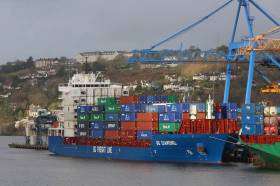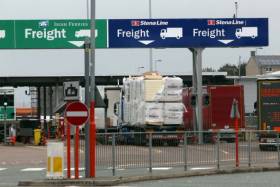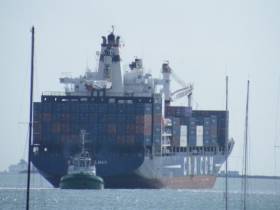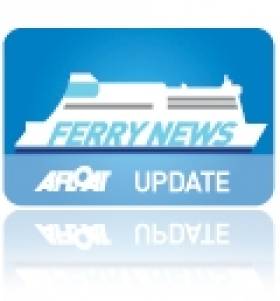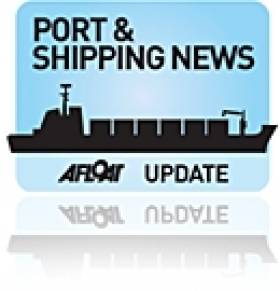Displaying items by tag: Irish Exporters Association
Irish Exporters Plead for Intensification of No-Deal Brexit Planning
#Ports&Shipping - Irish exporters reports RTE, have called for an urgent intensification of no-deal contingency planning by the government and the EU in the face of heightened uncertainty around Brexit.
The Irish Exporters Association (IEA) has warned that the risk of a disorderly exit by Britain from the EU has increased following the delayed vote on the EU-UK Withdrawal Agreement and today’s no-confidence vote on Theresa May’s leadership.
According to Simon McKeever, chief executive of the IEA, the potential economic impacts of the UK crashing out of the EU next year will be "immediate, extensive and far-reaching for Irish businesses."
For more on the story click here.
Exporters' from Ireland to UK: Reliance Higher Since Brexit Vote
#Ports&Shipping - Exporters from Ireland writes the Independent.ie are pumping more of their products into the UK despite Brexit, a survey shows.
Around the time of UK's EU referendum in June 2016, just under a third of exporters said they sold a quarter of their produce into the UK market.
That's now risen to 44pc of exporters. And 41pc say they plan to increase UK sales further in the next six months, according to the latest assessment from the Irish Exporters Association (IEA).
In the wake of the UK referendum in June 2016, the IEA surveyed its members views on Brexit's impact.
In January, it repeated the study and has now compared the results.
"What our analysis shows is the resilience of the Irish export industry," Simon McKeever, Irish Exporters Association chief executive, said.
About 93pc of IEA members do business with the UK; for most that accounts for less than a quarter of their sales, although the UK is becoming increasingly important since the initial survey.
Four out of 10 exporter say they plan to increase UK sales over the next six months, just 3pc say they'll reduce them, and 57pc say they'll maintain current levels.
For further reading on the survey click here.
Exporters from Ireland 'to Keep UK Land-Bridge after Brexit'
#ExportersBrexit - Exporters from Ireland that go through Britain to get their produce to mainland Europe or further afield should still be able to do so after Brexit, the Revenue Commissioners expect, writes The Independent.ie
Michael Colgan, head of Revenue's Brexit Unit, said it is the body's "working assumption" that the UK land bridge for firms would still be available.
Two-thirds of exporters go through Britain, and expectations of continued use of the land bridge will come as a huge relief.
Currently, the common transit procedure of the EU is used for the movement of goods between the 28 EU member states, the EFTA countries, Turkey, the former Yugoslav Republic of Macedonia and Serbia.
The rules are effectively identical to those of the Union transit.
According to the European Commission, these are used for customs transit operations between member states and are applicable to the movement of non-Union goods for which customs duties and other charges at import are at stake, and of Union goods, which, between their point of departure and point of destination in the EU, have to pass through the territory of a third country.
To read more click the link here.
Majority of Irish Exporters tied to UK Trade ‘Need Brexit Help’
#ports&shipping -A majority of Irish exporters, more than 9 out of 10 trading with the UK writes The Irish Examiner need some sort of help in next months budget to cushion the effects of Brexit, according to the Irish Exporters’ Association.
Calling for “strategic” investments in infrastructure, its survey said exporters based in rural areas complained that poor quality broadband and roads were hampering their efforts to do business.
Capital investments would help both Irish-owned firms and boost levels of foreign direct investment (FDI), said the association, which also wants the Government to provide compensation for firms struggling to deal with the slump in the value of sterling since Britain voted last year to leave the EU.
FDI levels would likely also be hit by housing shortages and skills shortages, according to the survey.
For more the newspaper has a report here.
Majority of Exporters Use UK for Transhipment of Goods Overseas
#ExportBrexit - Two thirds of Irish exporters go through Britain a survey suggests writes The Independent to get their produce to customers on mainland Europe and further afield.
And 40pc said that using a longer, yet more direct, route would adversely affect the quality of the product.
But 30pc of exporters quizzed for the survey by the Irish Exporters Association (IEA) have taken no action to assess the fallout from the Brexit vote, even though 70pc said a weakening sterling had impacted their business.
Marie Armstrong, IEA vice-president, said the number of exporters relying on the UK as a land bridge to the continent was "hugely significant".
"And those members are very concerned about continuing to use the UK in terms of customs, and being stopped at borders," Ms Armstrong told TDs yesterday.
For more on the survey's findings click here.
Irish Exports to UK Fall €300m in First 8 Months of 2016
#IrishEXports - A total €9.5bn worth of goods were exported to the United Kingdom in the first eight months of this year, according to the Central Statistics Office (CSO).
As reported on Newstalk, this represented a €300m drop from the €9.8bn it exported to Great Britain and Northern Ireland in the same period in 2015. This suggests that the Brexit vote and weakening sterling are starting to have an impact.
The new CSO data also shows we were importing less from the UK, down to €10.59bn for the first eight months of the year compared to the €11.53bn spend for the same period in 2015.
Ireland is the UK’s fifth largest trading partner. However, the value of Ireland's seasonally-adjusted goods exports fell by 11.5% following the UK's decision to leave the EU.
The price of the sterling also continues to drop, as Irish exporters face an uncertain future due to Brexit.
For more statistics click here
#IEAonBrexit - Irish Exporters Association members in which an overwhelming 92% of them believe the decision by the UK to leave the European Union will have a harmful effect on their business.
UTV News says the IEA published the results of their recent survey of members on Thursday.
They say that even though the UK has yet to leave the EU, they are still being impacted by the weakening of Sterling, which has fallen against the Euro by 19% since mid-November and by 9% since the vote.
Overall, 92% of members said they think the vote will have a harmful impact on Irish exporters. For more, click here
#ExportersBrexit - Bad news for Irish exporters into the UK as these imports will decline as foreign products become more expensive thanks to the weakening of sterling, ratings agency Fitch has warned.
The Irish Independent writes that a weaker sterling harms the competitiveness of Irish exporters because it cuts margins and makes it more expensive for them to do business in the UK. But it benefits UK domestic businesses.
The pound has weakened considerably since late last year. At the end of November, €1 bought 69 pence. At the close of polls on Thursday, that had weakened to 76 pence, but when the Brexit vote became apparent, it weakened further and is now hovering around the 83 pence mark.
Fitch said the fall in sterling will boost UK exports, but have a negative impact on imports.
"Imports look likely to decline as investment contracts and foreign products become more expensive, resulting in expenditure switching to domestically produced goods and services and higher inflation," the ratings agency has said.
The Irish Exporters Association and other business representative groups has already warned about the impact of currency fluctuations on Irish business.
Simon McKeever, the IEA chief executive, warned further weakening is likely.
And the organisation has called on firms to hedge against this and to talk to the banks.
For much more on this story click here.
Short Sea Shipping Award Goes to Stena Line
#FERRY AWARD – At the annual Irish Exporters Association's Export Industry Awards, among the categories was for the Short Sea Shipping Company of the Year 2012, which was awarded to Stena Line in Rosslare, Co. Wexford.
The award, sponsored by the Irish Maritime Development Office (IMDO), recognises the strategically important role of short sea shipping to our island economy. The other nominees were: Eucon Shipping and Transport Ltd., Dublin and Samskip Multimodal Container Logistics, Dublin.
Nominations Open for IEA ShortSea Operator of 2012
#PORTS & SHIPPING – Nominations are been sought for the Irish Exporters Awards 2012, which is to be held in November and hosted by Irish Exporters Association (IEA).
The role of the export sector has never been more important, and among the 13 award categories the IEA is being supported by the Irish Maritime Development Office (IMDO) in the search for the Short Sea Shipping Company of the Year 2012, a key category in the National Export Industry Awards.
The competition is to recognize the outstanding achievement in the delivery of maritime services to and from Ireland, while highlighting the strategically significant role it plays to our island economy. At the gala awards ceremony on 23rd November, which will culminate when the Taoiseach will present the category winner, and the overall Exporter of the Year.
Applications are available from: www.irishexporters.ie/action/ExportAwardsOnlineApplication



























